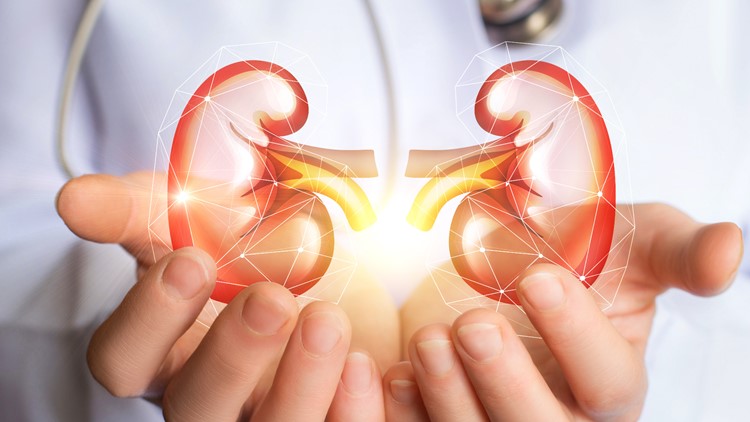BUFFALO, N.Y. — THIS CONTENT IS SPONSORED BY ROSWELL PARK COMPREHENSIVE CANCER CENTER
A sudden or unusual ache in the middle or lower portion of the back might have a person looking up all kinds of possible medical ailments online.
Back pain is one of the most common reasons people call a doctor, but the odds are very good that the cause will not be kidney cancer, says Eric Kauffman, MD, a urologist with Roswell Park Comprehensive Cancer Center.
“Kidney cancer is usually asymptomatic. We find it most often through scans that are attained for other reasons,” Dr. Kauffman says. “The most common symptom we see is blood in the urine. It’s uncommon, but that’s the most common symptom. Back pain in general is uncommon with kidney cancer because we don’t have the same kind of pain receptors on the kidney like we do on our skin or muscle. You don’t feel when things invade there.”
Kidney cancer is often asymptomatic
Blood in the urine can be a symptom of other ailments as well, including bladder cancer, and people who see blood in their urine should call their general practitioner to get tested. “Most often when we find blood in the urine, it’s not cancer, it’s caused by other reasons. But it’s still important to be checked for cancer of the kidney or bladder,” Dr. Kauffman says.
People who have larger tumors in their kidneys might be more likely to see blood in their urine, but it also depends on where in the kidney those tumors are growing. “It doesn’t necessarily have to do with how aggressive the cancer is,” Dr. Kauffman says. “If the tumor is near the center of the kidney where urine collects, it can lead to blood in the urine, even if the tumor is small. If a tumor is at the edge, it can grow big and not touch the area where urine collects in the center of the kidney, so there will be no blood seen in the urine.”
Back pain can be caused by many ailments
Although kidney cancer invasion does not cause pain, people might feel some pressure or pain in their back if there’s a blood clot blocking the urine from draining well from the kidney. This pain can be similar to when kidney stones block urine drainage from the kidney. Blood clots in the urine can form when the urine is bloody and are different from blood clots that form in veins.
Historically, some information on kidney cancer might have suggested back pain as a symptom because a large tumor itself could cause urine drainage to be blocked, causing discomfort and pressure on the person’s back. “That’s a rare presentation though,” says Dr. Kauffman.
Another outdated suggestion is that people might feel a lump on their flank, or side. “The average tumor we find these days is only about the size of a large strawberry, and even a tumor the size of a grapefruit you often can’t palpate, since the kidneys are deep in the abdomen and pinned against thick back muscles. It would typically need to be the size of cantaloupe, and it’s not too common these days to see tumors that size. You’d feel it in the front, not through the back, because the back muscle is strong enough that a tumor wouldn’t push through. Usually the doctor has to push down pretty deep with his or her hands; it’s not something that’s easily felt.”
Many kidney cancer patients don’t require immediate treatment
Around half of cases of kidney cancer are found by accident when they’re small and easily curable with treatment. “When we do find it, even if the tumor is a bigger size, the cure rates are still good. Only one in five patients these days will have a form of cancer that has spread beyond the kidney when it is first found,” Dr. Kauffman says.
Kidney cancer tends to be a less aggressive form of cancer, particularly when small in size, along the lines of prostate cancer in that not everyone diagnosed with it needs immediate treatment. Dr. Kauffman says he’ll monitor the progress of his patients with smaller than average tumors, and will suggest delaying an aggressive treatment until necessary, since the treatment itself can have complications and side effects. At Roswell Park, this active surveillance approach for kidney cancer is managed by a multidisciplinary team of kidney cancer experts who monitor the tumor for increasing size, faster growth and subtle changes that indicate a need for treatment. “Many patients are thus able to safely avoid treatment,” says Dr. Kauffman.
Like with other cancers, risk factors for kidney cancer include being overweight, smoking, having high blood pressure and being older. Quitting smoking, controlling weight and keeping blood pressure under control can help reduce a person’s risk of developing the disease.
For more information visit https://www.roswellpark.org/.



